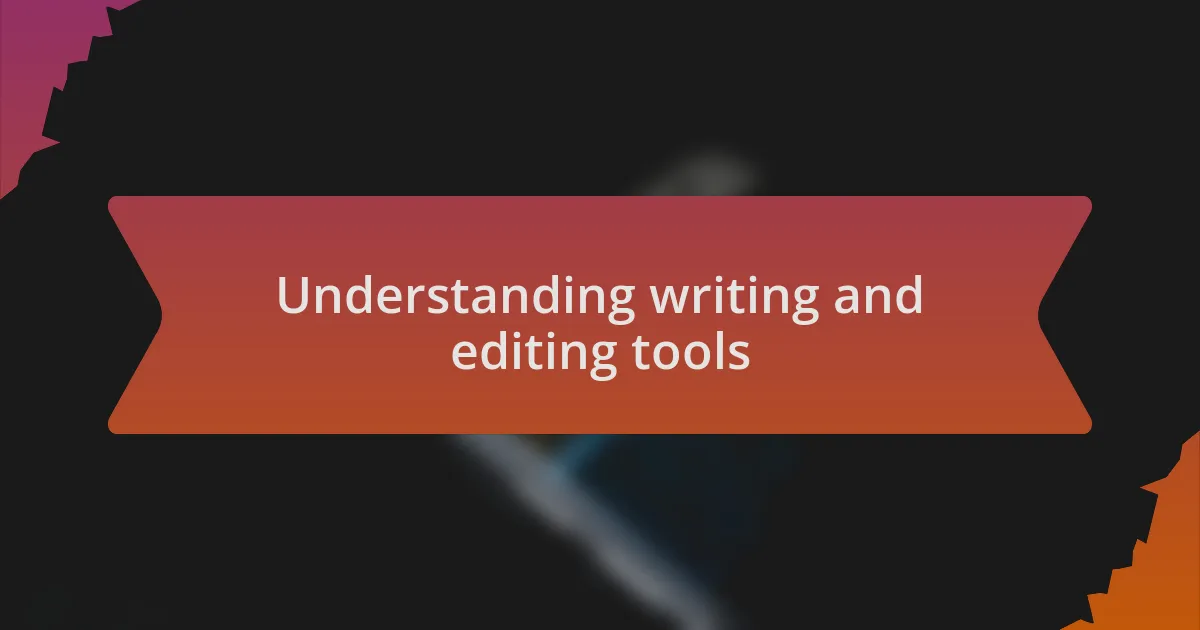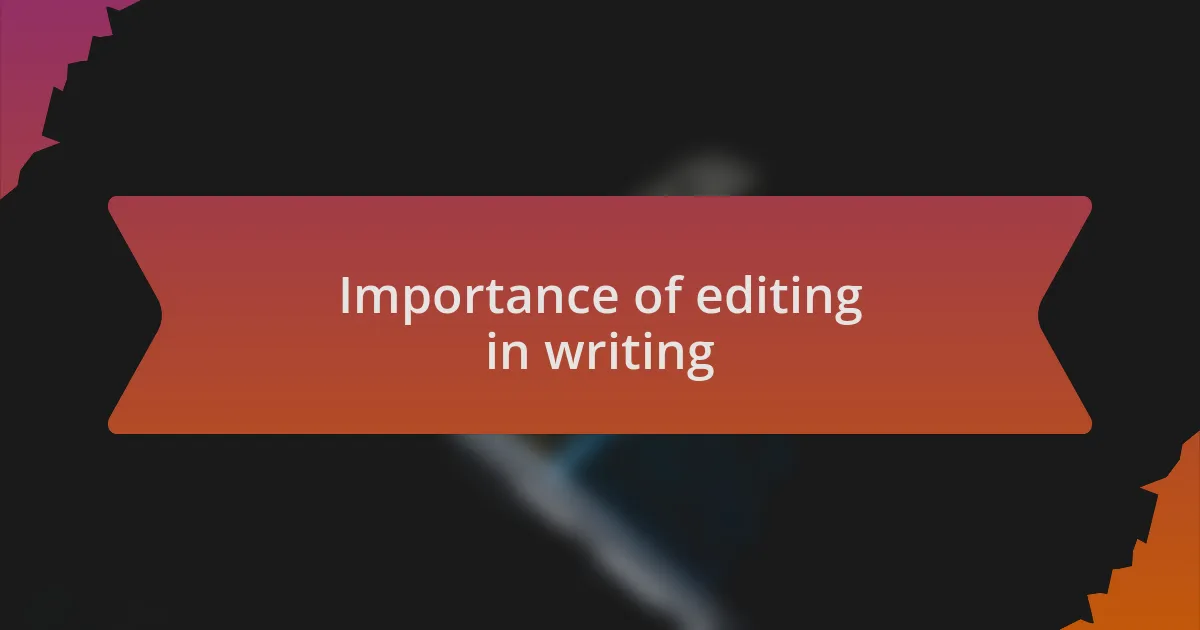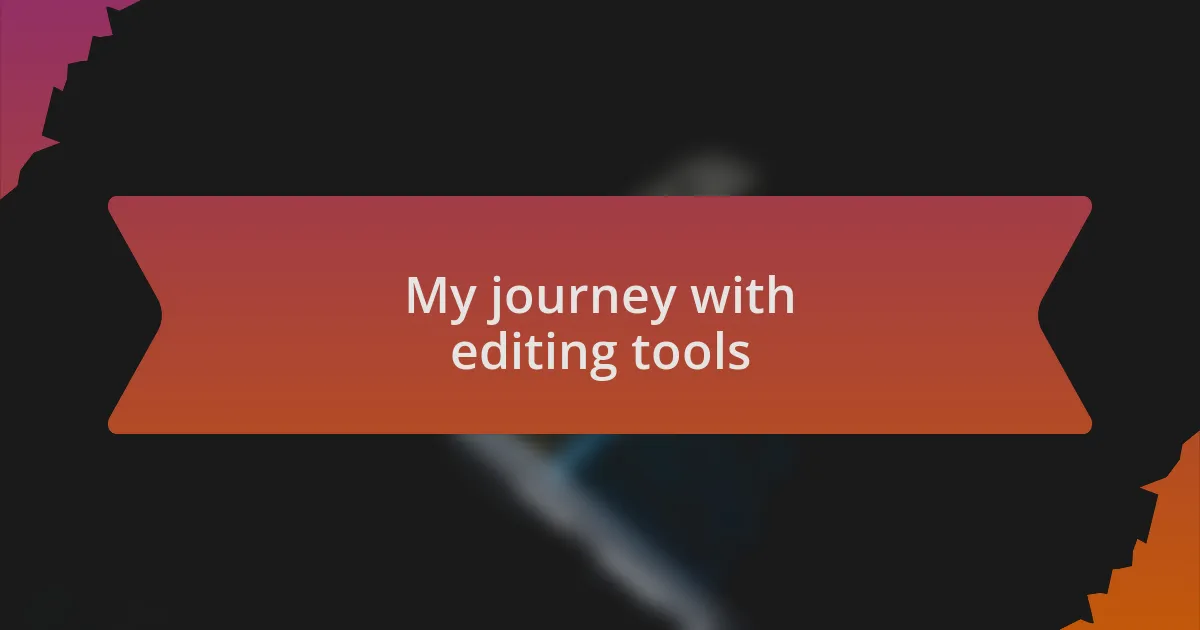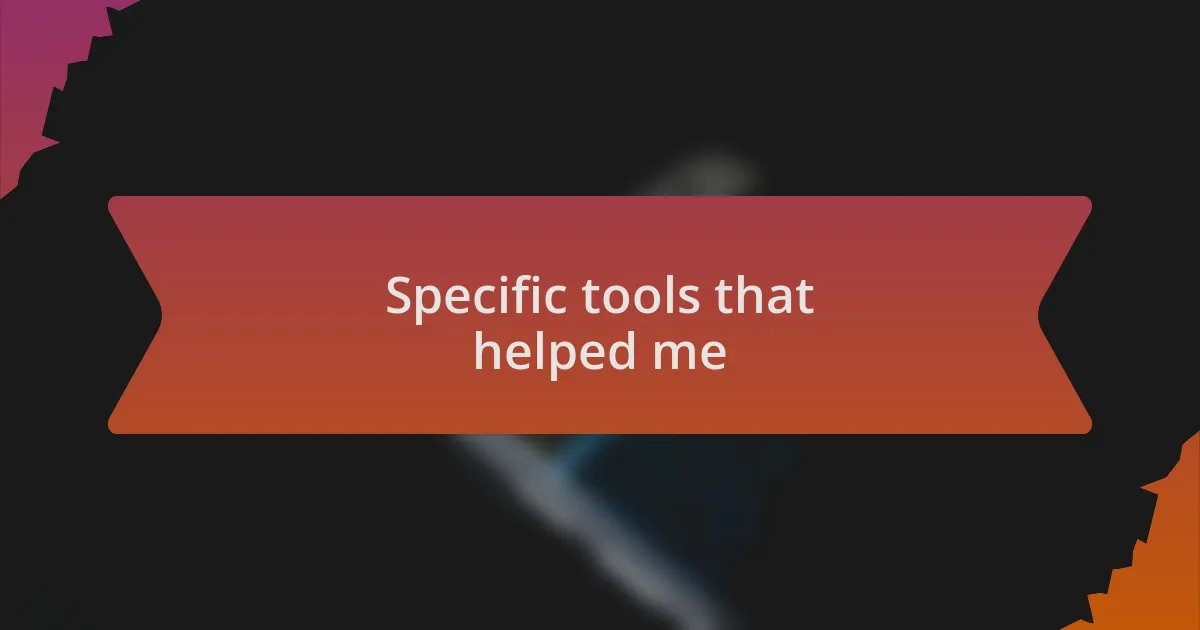Key takeaways:
- Embracing editing tools enhanced clarity and refined the author’s unique voice, bridging the gap between creativity and audience understanding.
- Collaboration and feedback from peers using these tools fostered a supportive writing community and improved the overall writing process.
- Specific tools like Grammarly and Hemingway Editor highlighted common writing flaws, emphasizing the significance of clarity and simplicity in effective communication.
- The editing process was revealed as transformative, moving beyond mere correction to enriching the author’s writing experience and confidence.

Understanding writing and editing tools
Writing and editing tools have become essential in my journey as a writer. When I first stumbled upon grammar checkers, I was skeptical. Did a machine really understand the nuances of my voice? To my surprise, it helped me spot errors that I often overlooked, making my writing clearer and more polished than before.
As I delved deeper into these tools, I discovered features like style suggestions and readability scores. I vividly remember receiving feedback indicating my writing was too complex for the intended audience. It was an eye-opener! I began to appreciate the balance between creativity and clarity. Have you ever wondered how easy it could be to ensure your audience truly connects with your message?
In the process, I also started using collaborative editing platforms that allowed me to share my drafts with peers. The instant feedback was invaluable, and I realized that two heads are indeed better than one. Embracing technology not only enhanced my writing but also fostered a supportive community around my work. How beneficial would it be for you to receive instant insights on your writing before hitting publish? It’s an inviting thought, isn’t it?

Importance of editing in writing
The role of editing in writing cannot be overstated. I still remember the first time I submitted an article without giving it a thorough edit. It felt like sending my child out into the world unprepared. I was met with a barrage of constructive criticism, and it hit me deeply. That experience taught me that editing is not just about correcting mistakes; it’s about refining thoughts and presenting my best self.
When I began to regularly use editing tools, I discovered a different side to my writing. The process became a journey of exploration; I could see how the smallest changes could enhance clarity and impact. For instance, I often found awkward sentences that, when rephrased, transformed my message entirely. Have you experienced that moment of revelation when you realize how one edit can change the tone of a passage? It’s exhilarating and essential.
Moreover, embracing the editing process allowed me to cultivate my unique voice. I recall a time when I over-explained my points, thinking more words would convey more ideas. A simple editing tool helped me cut my word count significantly, and to my surprise, the message resonated stronger. Are we sometimes too invested in our words, fearing that fewer words mean less meaning? Trusting the editing process taught me to prioritize clarity over quantity, enriching my writing experience immensely.

Overview of popular editing tools
When I first ventured into using editing tools, I was amazed by the variety available. Programs like Grammarly and Hemingway quickly became staples in my writing routine. They not only highlight grammatical errors but also provide insights on readability and tone—elements I had often overlooked before. Have you ever felt like your writing was good, only to be challenged by a tool that revealed its flaws? It’s a humbling yet valuable experience.
I particularly enjoy using ProWritingAid for its comprehensive feedback on style and structure. I remember one instance where the software pointed out repeated phrases that had crept into my work. Realizing this not only improved the flow of my writing but also sparked a newfound awareness of my tendencies. It’s like having a coach who gently nudges you towards better choices. Isn’t it fascinating how tools can open our eyes to our own habits?
Another favorite of mine is the FocusWriter application. It creates a distraction-free environment, allowing me to concentrate on editing my pieces without the noise of notifications or multiple tabs. I vividly recall editing an article late at night, where the simplicity of FocusWriter helped me dive deep into my content. How much more effective can we be when our surroundings support our focus? That night, I realized that the right environment paired with smart tools could lead to profound improvements in my writing.

My journey with editing tools
As I delved deeper into the world of editing tools, I discovered that small adjustments could lead to significant improvements. For instance, I remember a time I used an online editor to refine a resume. The feedback highlighted areas of redundancy that I had been blind to, and seeing those suggestions made me realize how often we overlook our own writing flaws. Have you ever been surprised by how much clarity simple edits can bring?
One day, while testing out a new app, I was taken aback by its ability to detect tone alongside grammar. It flagged sections of my writing that seemed too formal for a casual piece, prompting me to rethink my approach. I felt a mixture of surprise and relief that such tools could help align my voice with my audience’s expectations. It was a wake-up call. Wouldn’t it be liberating to write in a way that truly resonates with who you want to reach?
Reflecting on my journey, I can see how far I’ve come with these tools by my side. The moment I realized the editing process wasn’t just about fixing mistakes but enhancing my unique voice was transformative. I remember sitting with a cup of coffee, hesitating to hit publish on an article that had undergone extensive revisions. When I finally did, I felt more confident knowing I had crafted it with care, thanks to the support of these editing tools. Isn’t it amazing how technology can elevate our craft in such a meaningful way?

Specific tools that helped me
When I first started using Grammarly, it felt like having a personal writing coach right at my fingertips. One evening, as I worked on a blog post, I was stunned by the number of passive voice constructions it flagged. I hadn’t even realized my writing had become so detached. Seeing those suggestions made me rethink my sentence structure entirely. How often do we unknowingly slip into patterns that weaken our writing?
Another tool that significantly impacted my editing process was Hemingway Editor. I remember the first time I pasted a lengthy paragraph into it and watched the readability score drop. The app highlighted complex sentences, pushing me to simplify my thoughts. It was a true eye-opener—suddenly, I understood the importance of clarity over complexity. Isn’t it interesting how sometimes the best writing is the simplest?
Then there’s ProWritingAid, which truly took my editing to the next level. I recall one late night, pouring over a piece, and the in-depth analysis it provided showed me not just errors but also patterns in my writing style. I was amazed to see how it pointed out overused words and clichés that I had never noticed. It felt empowering to have those insights, almost like having a writing mentor guiding me. Have you ever had a moment where feedback transformed your perspective on your writing?